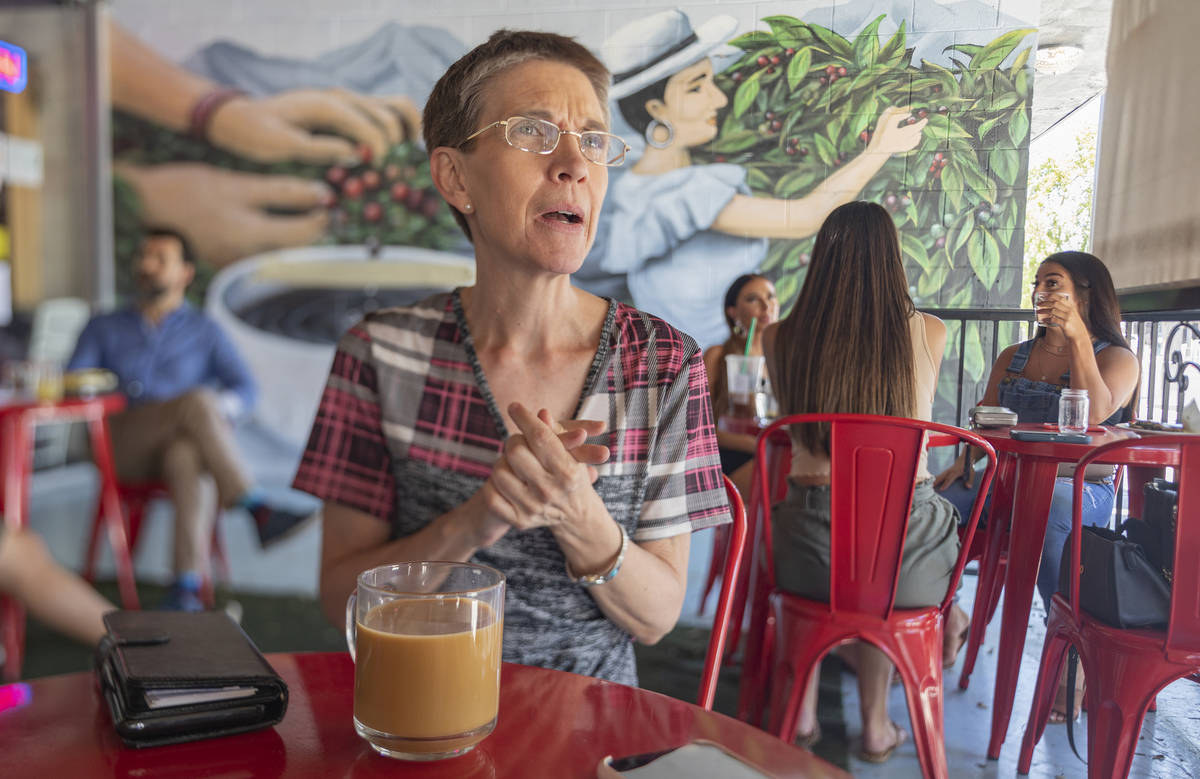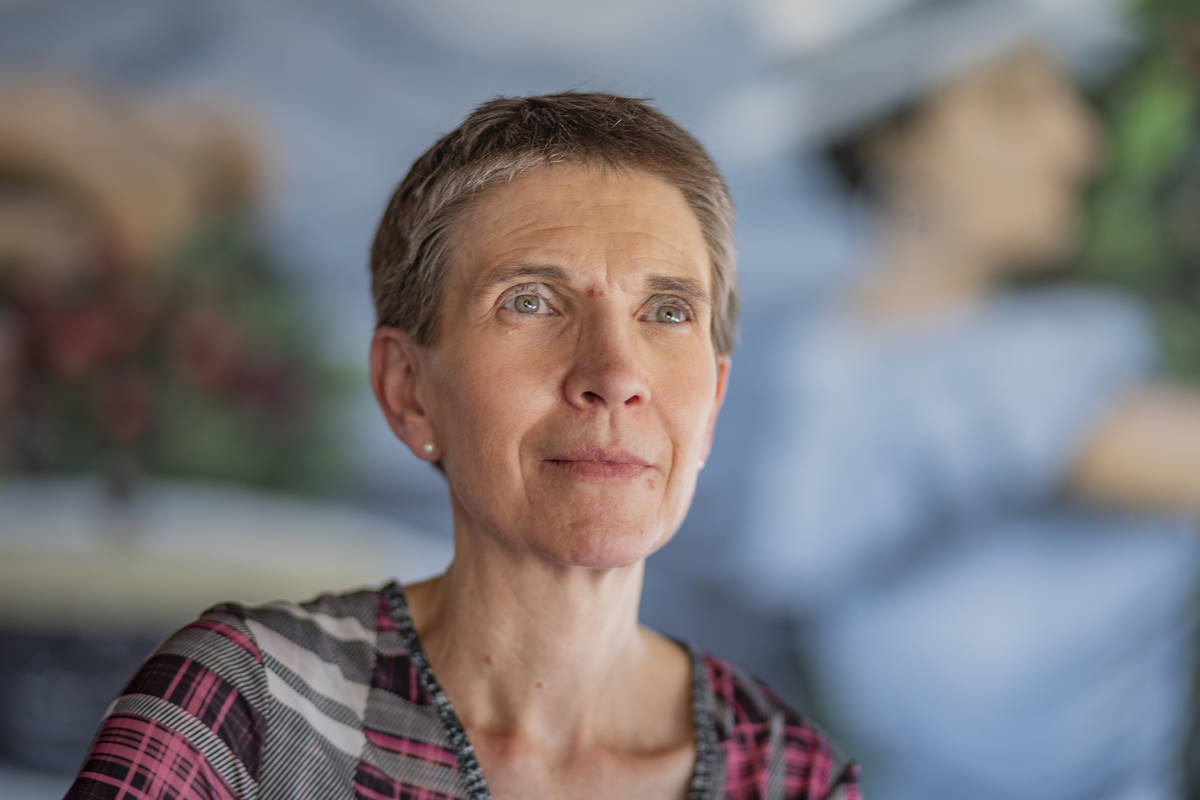Nevada professor pursues progress 100 years after women got the vote
What really makes Sondra Cosgrove happy about the choice of California Sen. Kamala Harris as the Democratic vice presidential nominee isn’t just that she’s a woman.
It’s the kind of woman she is, said Cosgrove, president of Nevada’s chapter of the League of Women Voters.
“I like her because I think she’ll hold the Democrats accountable. I don’t think she’ll toe the party line,” Cosgrove said. “She’ll speak truth to power.”
And now, 100 years after women relentlessly lobbied elected officials to get the right to vote, even chaining themselves to the White House fence, things have changed considerably. But Cosgrove said it’s about more than just getting women into high-profile jobs. It’s how they’re treated — and how they act — once they get there that counts.
“Do you allow women to be their authentic selves? Do you allow them to speak truth to power?” Cosgrove asked. Those are the hallmarks of real progress, she said, and by that standard, Harris was an excellent choice.
Added Cosgrove: “I think she’s going to be a very consequential vice president.”
Leading the league
And Cosgrove is in a position to know. Not only is she politically active as the league’s president, but she’s a professor of history at the College of Southern Nevada. In those roles, she knows many of the issues women confronted when the league was formed six months before the 19th Amendment was ratified, they are still facing today.
“When the league first began, there was a platform with a list of issues that were important to women that had never been talked about, like child care, equal pay and being treated OK in the workplace,” Cosgrove said. “It’s still the same stuff we’re arguing about today.”
The league, a nonpartisan civics organization, was founded by Carrie Chapman Catt, who realized that women would not have the knowledge necessary to be active in the political world soon open to them, Cosgrove said.
The initial focus of the league was on registering women to vote, teaching them how to be informed about the issues and candidates on the ballot and providing them the tools necessary to run for office. Now, it has grown to advocate on behalf of a broader swath of political issues while still retaining its essential purpose of voter engagement.
This emphasis on education has resonated deeply with Cosgrove. As president, she aims to engage the public in the political process by teaching people to hold elected officials accountable and leading by example.
“I can’t be out there saying, ‘Go do this,’” Cosgrove said. “I need to say, ‘Follow me.’ ”
‘History explains things’
Cosgrove grew up in southern Utah and moved to Las Vegas in 1986 with her family, where she later attended UNLV and earned a Ph.D. in history. She teaches U.S. history, Nevada history, history of Mexico and Indigenous history at CSN.
Though never particularly fond of math in school, Cosgrove has come to realize history is a lot like algebra — historians try to figure out how social, political and economic variables equate to a given historical outcome.
Cosgrove used the Civil War as an example. As historians identify the variables that led to the war, a formula is produced so, ideally, similar circumstances can be identified and avoided.
“History explains things. That’s why I like it,” Cosgrove said. “Students ask me, ‘Why do we keep making the same mistakes over and over and over again?’ There’s a reason why — we don’t learn our history.”
DeAnna Beachley, a professor at CSN who has known and worked with Cosgrove for nearly 20 years, said Cosgrove has brought her civics expertise to the campus through organizing speaker panels, voter registration events and working to establish a polling location on campus.
“If we could all have the same amount of energy that she has, it would be a very different world,” Beachley said. “The fact that she is so incredibly dedicated is something that speaks well to her character.”
Cosgrove joined the League of Women Voters in 2008 and has served as its Nevada chapter president since 2015.
Though the league’s membership is composed of more than just women, Cosgrove said that as a women’s organization, the league strives to do things differently.
This begins within the organization itself, she said, where collaboration is championed and anyone who wants to be involved in leadership is immediately mentored by Cosgrove or another member of the board.
Outwardly, Cosgrove also leads advocacy efforts for each legislative session. In the last session in 2019, she was involved in passing legislation that ensured people with mental illnesses who are arrested are provided psychological evaluations and released from jail with an ID and debit card to pick up their prescriptions. Cosgrove is also actively working with the league to advocate against the policing of mental and behavioral health by allocating funds away from the police budget toward social services.
Cosgrove’s son has bipolar disorder, and she is always worried that one day he may be approached by police who do not understand how to address those with mental illnesses.
Beyond learning from history in textbooks, she said people also must learn from history in real time — including understanding that the use of force or detention may be harmful those with mental illnesses. In this and other regards, Cosgrove said the league is aligned with the Black Lives Matter movement to reallocate the police budget.
“I hear Black moms say ‘I’m afraid my son’s going to get shot,’ and I understand,” Cosgrove said. ‘I’m from an average white family, and I’m terrified my son’s going to get shot if he has a manic episode and is stopped by the police.”
Now, she is spearheading the league’s efforts to pass a Nevada constitutional amendment to prevent gerrymandering — a process that has become exceedingly arduous, and ultimately pushed to a temporary halt, amid a global pandemic.
Fair Maps Nevada
The League of Women Voters is in a coalition with Indivisible Northern Nevada and RepresentUS in the Fair Maps Nevada political action committee, which aims to transfer the redrawing of Nevada legislative districts from the Legislature to an independent commission.
When this process is left to the Legislature, the party in power may redraw legislative lines to favor their party — or, gerrymander. Cosgrove said this often leads to only one person running for office in a district where a party has significant control, creating less competitive elections where voter turnout is low. Elected officials in those districts have much less incentive to compromise as they cater to the base voters whom they need to win. And the Supreme Court in 2019 ruled that partisan gerrymandering was a political question beyond the reach of the courts to cure, a decision that opponents said paved the way for more mischief.
“I’m a firm believer that if you have the best ideas, you can win on your own and not need to cheat,” she said.
But the committee encountered many roadblocks as it tried to petition to get the measure on the upcoming November ballot.
Rev. Leonard Johnson, a politically active pastor, sued the committee in November, saying the description of the amendment as it appeared on the petition was misleading.
Most recently, the coronavirus pandemic prevented the signature collection process, which was necessary for the measure to appear on the November ballot. Fair Maps Nevada sued the state to extend the signature deadline to Aug. 3 and enable electronic signatures. The group got the extra time, but not permission to use electronic signatures.
“Everybody agrees it’s secure,” Cosgrove said. “If it’s good enough for voter registration, it’s good enough to sign a petition.”
The league announced Aug. 3 that the petition did not receive enough signatures to appear on the 2020 ballot but will be working to ensure it appears in 2022. Cosgrove said the league is compiling a database of more than 200,000 supporters who will immediately sign the petition when the amendment is refiled in 2021. In the meantime, she said, she’s working with state lawmakers to try to get the measure before the 2021 Legislature.
UNLV associate professor Michael Green, who has known Cosgrove for 20 years, said he has seen Cosgrove continually fight for a more inclusive legislative body that works for the people at the state level, which this amendment would enhance.
Voter suppression has been more extreme in the past, including after the 19th Amendment was ratified. Black women in the South were lynched for trying to exercise their right to vote, and all Native American women weren’t granted the vote until the 1960s, Cosgrove said.
To fully understand the history of the women’s vote and its modern implications, Cosgrove said it is important to also understand that the 19th Amendment was not the end of the fight for suffrage, but a beginning to a continued effort for equal representation in government.
‘Things aren’t finished’
Nevada led the way in electing the nation’s first majority-female Legislature in its last session, which garnered national attention, but Cosgrove wondered about the kinds of tangible changes and impacts this fostered.
In June, Cosgrove was awarded the Carrie Chapman Catt prize from the University of Ohio, which included a grant that Cosgrove and other researchers are using to see if the women-led Legislature actually changed the political narrative in Nevada.
This process will include tracking how many bills sponsored by women were signed by the governor, the number of women in leadership positions and diversity among women elected. So far, Cosgrove has found that where rules were followed among committees — such as ensuring everyone has the chance to speak before people are allowed to speak twice — women thrived.
“You can’t just say, ‘Elect women,’ it also has to be diverse women, and parliamentary procedure has to be followed,” Cosgrove said.
As the League of Women voters also celebrated its centennial earlier this year, Cosgrove said much of the conversation at their virtual conference was centered around the tokenism of women — especially diverse women — in elected positions and how the league, with its large population of older white women, can use its privilege to advocate for greater change.
“We talked about, ‘Is this enough — being pandered to?’ No,” Cosgrove said. “We have (a majority) female Legislature, but if you look at the (Democratic Party’s) leadership — Harry Reid, Steve Sisolak, Jason Frierson — it’s all men. That doesn’t count. You can’t invite the ladies over and tell them what to do. They need to be in leadership positions. We want to see diverse women advancing in both political parties.”
Early in the 2019 session, state Sen. Nicole Cannizzaro replaced Kelvin Atkinson as Senate majority leader after he agreed to plead guilty to federal campaign finance charges. When that happened, she became the state’s first female majority leader.
So where are we now after these 100 years of women’s voting rights, Cosgrove asked? Her short answer — nowhere near the end.
“Things aren’t finished,” she said, adding that the rights already granted to women may just as easily be taken away, necessitating constant vigilance and advocacy.
“In the next 200 years, we’re shaking everything up,” she said.
Contact Amanda Bradford at abradford@reviewjournal.com. Follow @amandabrad_uc on Twitter.
























